The UK national debt is the total amount of money the British government owes to the private sector and other purchasers of UK gilts (e.g. Bank of England).
- UK public sector net debt (ex public sector banks) was £2,685.6 billion or 98.1% of GDP (20 Dec 2024).
- The OBR have forecast substantial rises in UK debt over the coming decade because of demographic factors, putting strain on UK spending.
- Source: [1. ONS public sector finances,- HF6X] (page updated 20 Jan 2024)
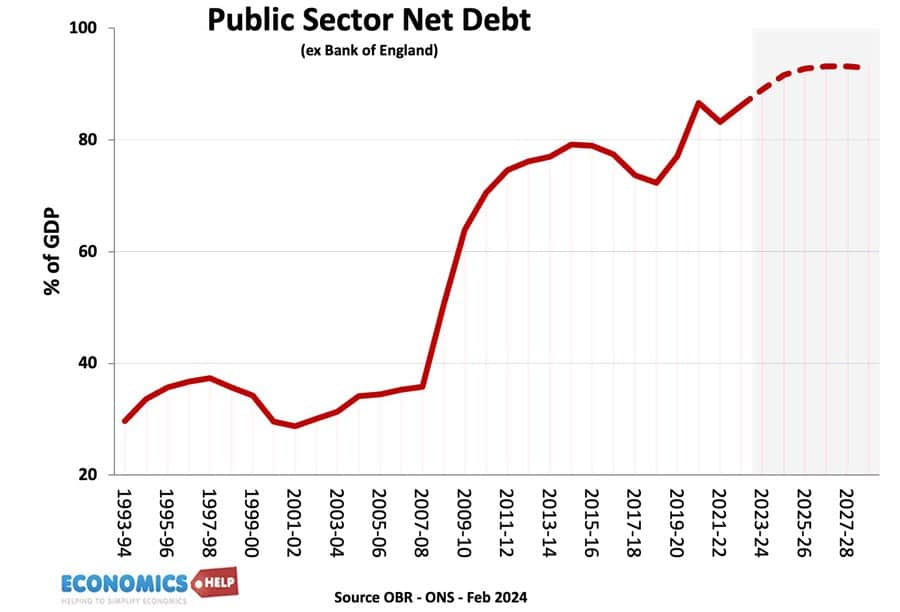
Source: ONS debt as % of GDP – HF6X | PUSF – public sector finances at ONS
Reasons for National debt
- Enables the government to spend more during periods of national crisis, e.g wars, pandemics, and recessions.
- In a recession, the government will automatically receive lower tax revenues (less VAT and income tax) and will have to spend more on benefits (e.g. more unemployment benefits) This causes a cyclical rise in debt.
- Extra government borrowing during a recession can help provide fiscal stimulus to promote economic recovery. By borrowing and then spending more, the government is injecting demand into the economy and this can help to reduce unemployment. This is known as fiscal policy and was advocated by J.M. Keynes.
- Strong market demand for government debt. Private investors buy gilts because they are seen as risk-free investments and there is also an annual dividend from the bond yield. Since 2009, there has been strong demand despite very low-interest rates, meaning the government can borrow very cheaply.
- Finance investment. The government could borrow to finance public investment projects that can lead to higher growth in the future.
- Political convenience. There is usually political pressure to cut taxes and increase government spending. Allowing debt to rise can be a way for the government to avoid difficult choices.
Forecast for the National debt?
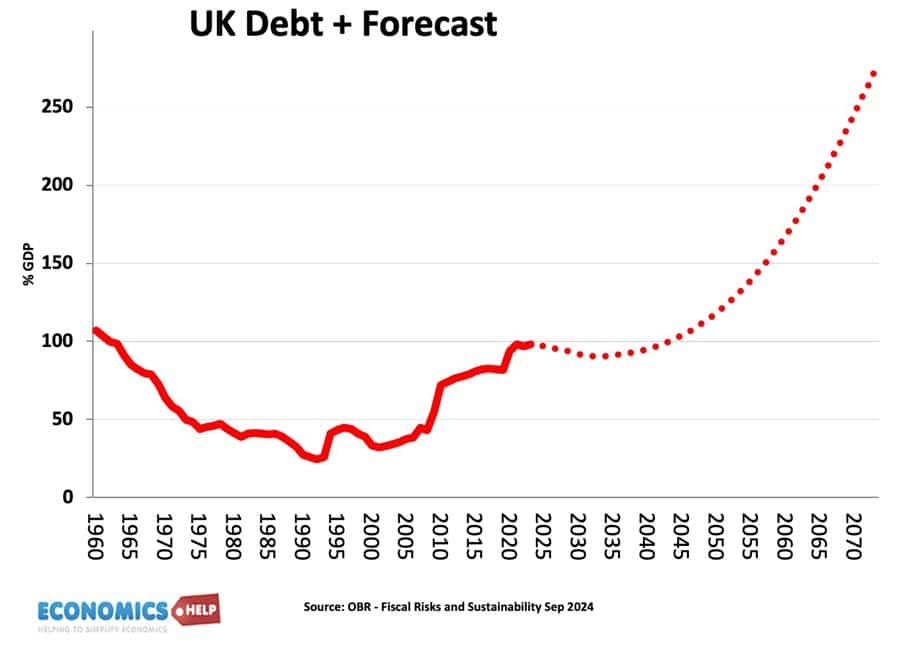
Source: Fiscal risks and sustainability – OBR – Economic and Fiscal Outlook Oct 2024
The OBR have forecast that, on our given trajectory, UK public sector debt could reach 350% of GDP within 50 years. The pessimistic outlook for national debt is made because
- An ageing population and demographic changes will put increased pressure on government spending, notably health care and pension spending.
- A smaller working population will limit UK’s productive capacity.
- Stress on finances from geopolitical events, such as frostier relations with China, Russia and the Middle East.
- Higher energy prices
- Costs of climate change.
- Declining tax revenues from petrol in a decarbonising economy.
- Low productivity growth of UK since the financial crash of 2009
- Recent boost to debt from the financial crisis and one-off cost of Coronovirus pandemic, which cut tax revenues and required government support for lockdown measures.
UK debt in context
Predicting debt for the next 50 years is difficult since we don’t know what kind of productivity improvements may come, e.g. continued gains in renewable energy may reduce the burden of higher oil and gas prices. Equally, the costs of environmental change could be worse.
History of the national debt
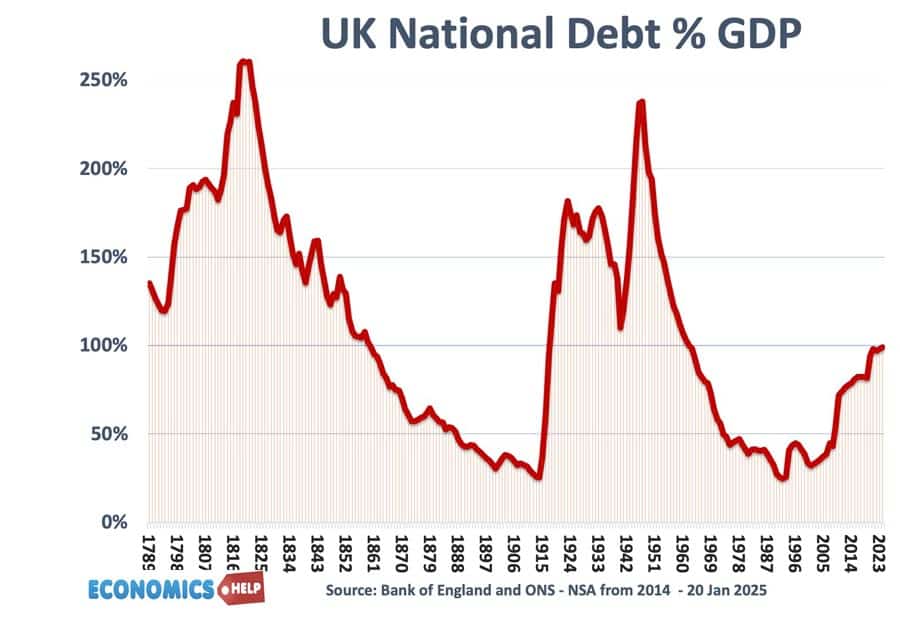
Main article: History of UK national debt
UK national debt since 1900
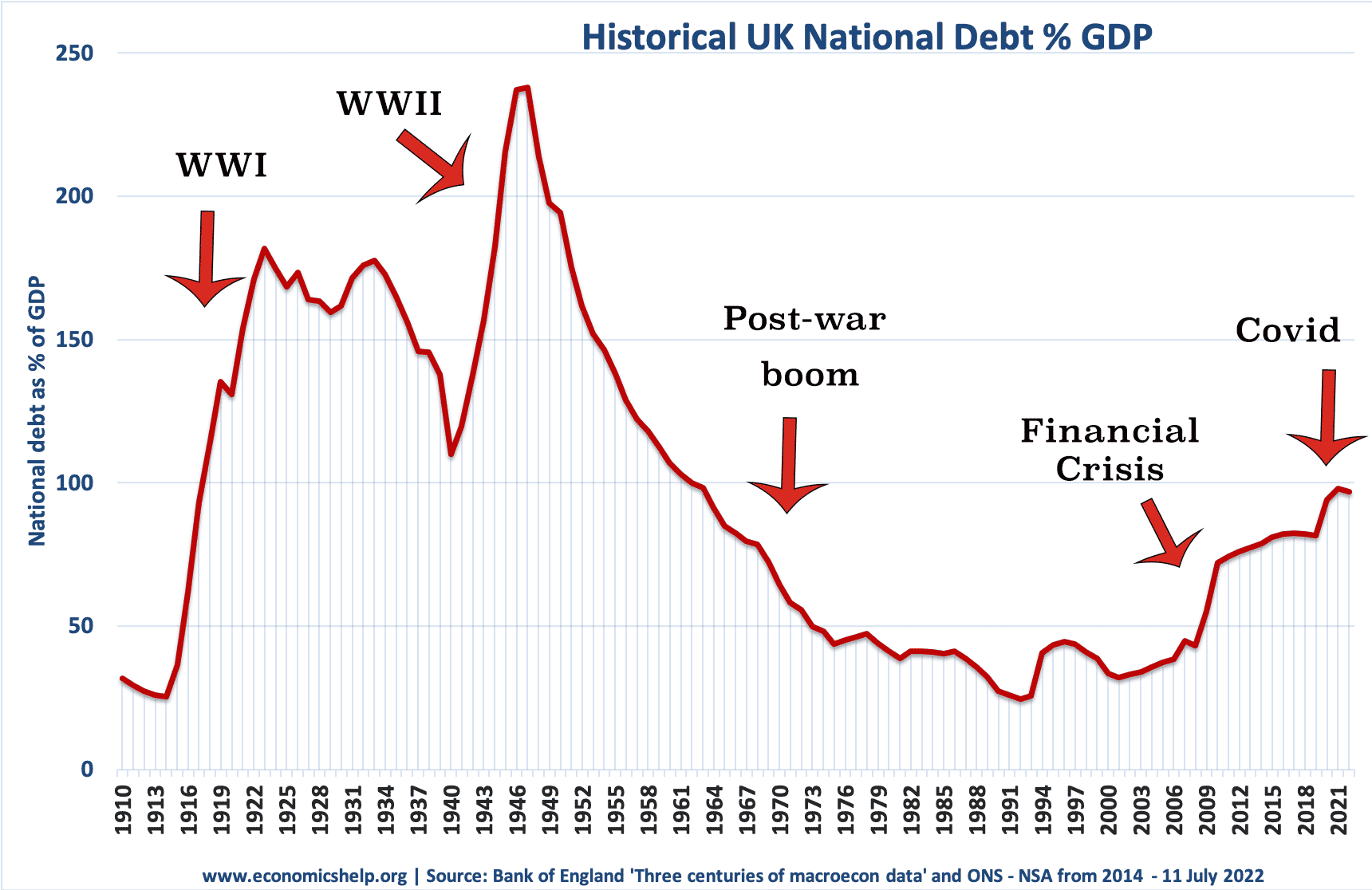
Source: Reinhart, Camen M. and Kenneth S. Rogoff, “From Financial Crash to Debt Crisis,” NBER Working Paper 15795, March 2010. and OBR from 2010.
These graphs show that government debt as a % of GDP has been much higher in the past. Notably in the aftermath of the two world wars. This suggests that current UK debt is manageable compared to the early 1950s. (note, even with a national debt of 200% of GDP in the 1950s, UK avoided default and even managed to set up the welfare state and NHS.
Debt reduction and growth
The post-war levels of national debt suggest that high debt levels are not incompatible with rising living standards and high economic growth.
- The reduction in debt as a % of GDP 1950-1980 was primarily due to a prolonged period of economic growth. See: how the UK reduced debt in the post-war period
- This contrasts with the experience of the UK in the 1920s when in the post First World War, the UK adopted austerity policies (and high exchange rate) but failed to reduce debt to GDP. Debt in Post-First World War period.
Budget deficit – annual borrowing
This is the amount the government has to borrow per year.
- Government
- borrowing in the financial year to December 2024 was £129.9
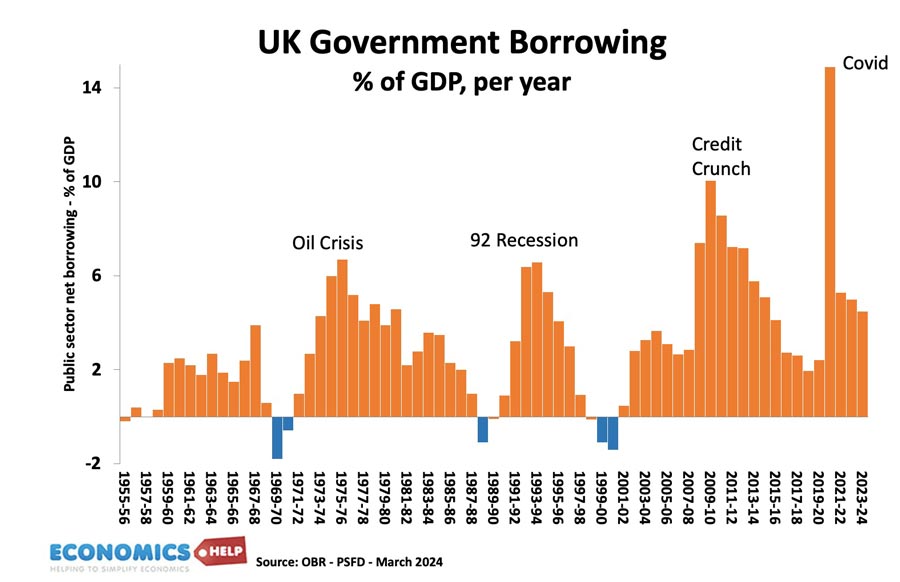
Annual borrowing since 1950. Figures for 2023-24 are forecasts (and rather optimistic!)
Debt and bond yields
Bond yields a the interest that the government pay bond/gilt holders. It reflects the cost of borrowing for the government. Lower bond yields reduce the cost of government borrowing.
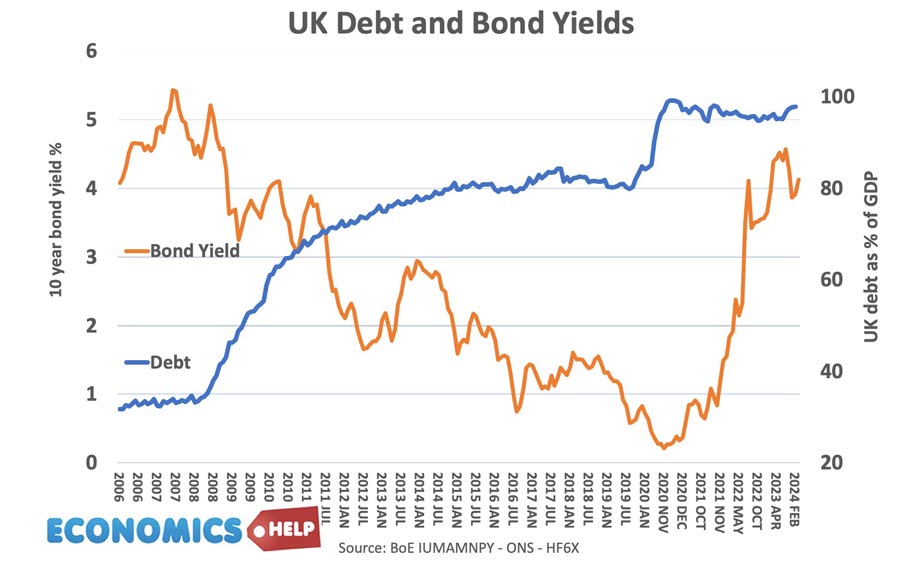
Between 2007 and 2020, UK bond yields fell. Countries in the Eurozone with similar debt levels saw a sharp rise in bond yields putting greater pressure on their government to cut spending quickly. However, being outside the Euro with an independent Central Bank (willing to act as lender of last resort to the government) means markets don’t fear a liquidity crisis in the UK; Euro members who don’t have a Central Bank willing to buy bonds during a liquidity crisis have been more at risk to rising bond yields and fears over government debt.
See also: Bond yields on European debt | (reasons for falling UK bond yields)
Since 2021, bond yields have risen due to pick up in inflation
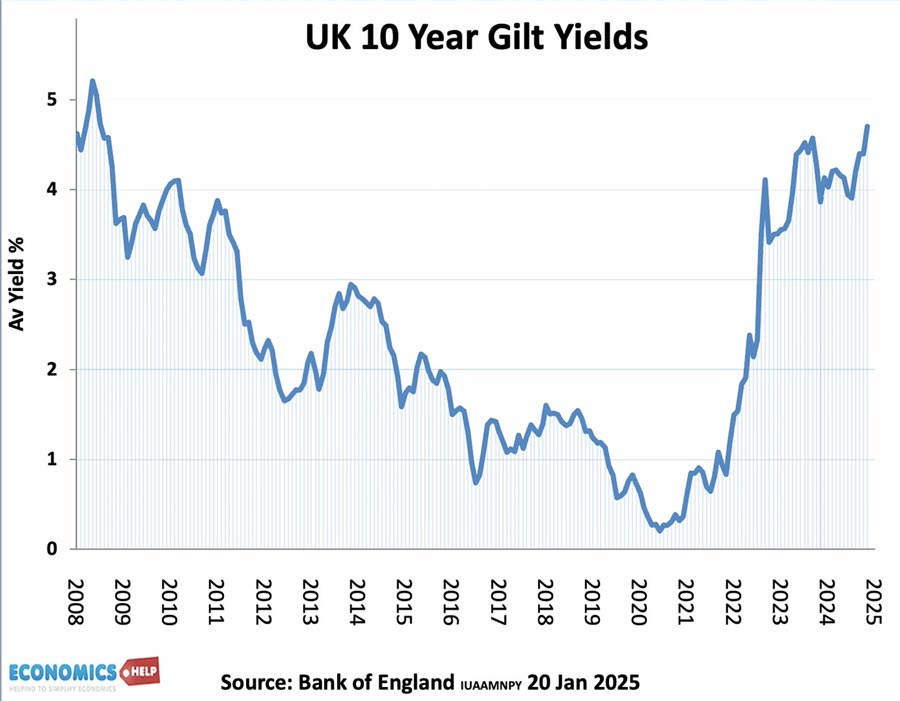
Cost of Interest Payments on National Debt
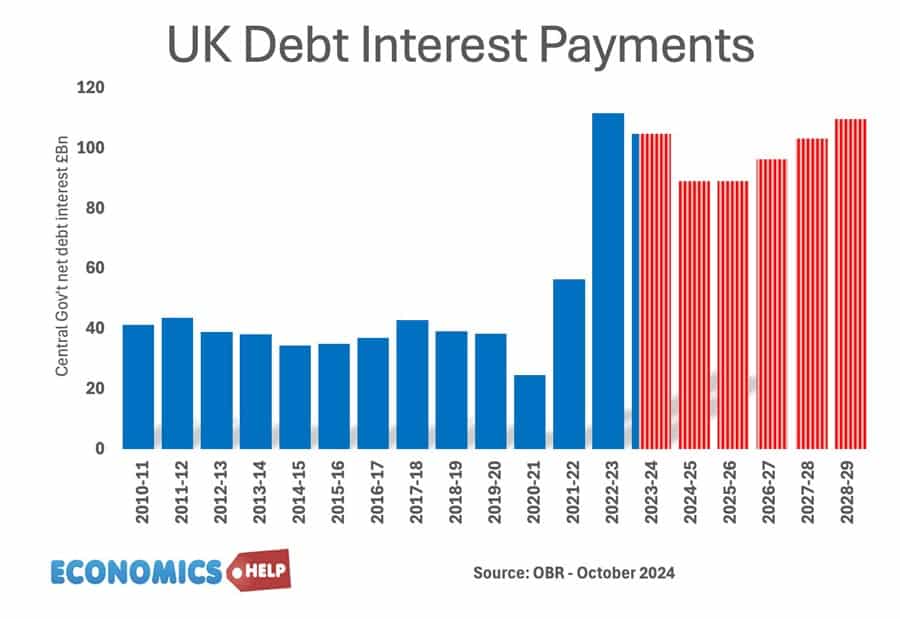
The cost of National debt is the interest the government has to pay on the bonds and gilts it sells. According to the OBR in 2023-24, debt interest payments will be £108 billion. (3.2% of GDP) or 5.2% of total spending. It is lower than in previous decades because of lower bond yields.
See also: UK Debt interest payments
The era of low interest rates post 1992 helped to reduce UK debt interest payments as a ratio of government revenue. However, with interest rates and borrowing increasing – debt interest cost have increased significantly.
Potential problems of National Debt
- Interest payments. The cost of paying interest on the government’s debt is very high. In 2011 debt interest payments will be £48 billion a year (est 3% of GDP). Public sector debt interest payments will be the 4th highest department after social security, health and education. Debt interest payments could rise close to £70bn given the forecast rise in national debt.
- Higher taxes / lower spending in the future.
- Crowding out of private sector investment/spending.
- The structural deficit will only get worse as an ageing population places greater strain on the UK’s pension liabilities. (demographic time bomb)
- Potential negative impact on the exchange rate (link)
- Potential of rising interest rates as markets become more reluctant to lend to the UK government.
However, government borrowing is not always as bad as people fear.
- Borrowing in a recession helps to offset a rise in private sector saving. Government borrowing helps maintain aggregate demand and prevents a fall in spending.
- In a liquidity trap and zero interest rates, governments can often borrow at very low rates for a long time (e.g. Japan and the UK) This is because people want to save and buy government bonds.
- Austerity measures (e.g. cutting spending and raising taxes) can lead to a decrease in economic growth and cause the deficit to remain the same % of GDP. Austerity measures and the economy | Timing of austerity
Who owns UK Debt?
The majority of UK debt used to be held by the UK private sector, in particular, UK insurance and pension funds. In recent years, the Bank of England has bought gilts taking its holding to 25% of UK public sector debt.

Source: DMO Debt Management Report 2022/23
- Overseas investors own about 28% of UK gilts (2022).
- The Asset Purchase Facility is purchases by the Bank of England as part of quantitive easing. This accounts for 26% of gilt holdings.
Total UK Debt – government + private
- Another way to examine UK debt is to look at both government debt and private debt combined.
- Total UK debt includes household sector debt, business sector debt, financial sector debt and government debt. This is over 500% of GDP. Total UK Debt
Private sector savings
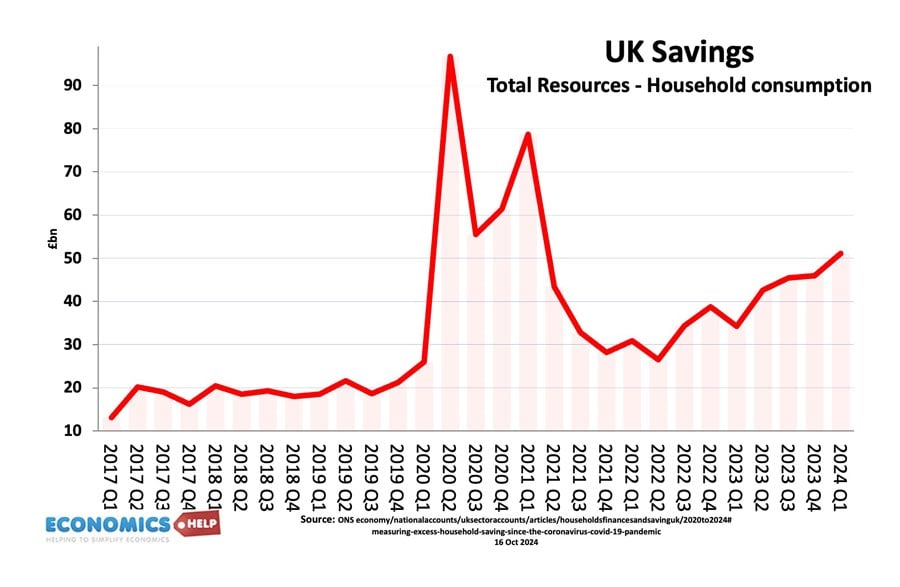
When considering government borrowing, it is important to place it in context. From 2007 to 2012, we have seen a sharp rise in private sector saving (UK savings ratio). The private sector has been seeking to reduce their debt levels and increase savings (e.g. buying government bonds). This increase in savings led to a sharp fall in private sector spending and investment. The increase in government borrowing is making use of this steep increase in private sector savings and helping to offset the fall in AD. see: Private and public sector borrowing
Comparison with other countries
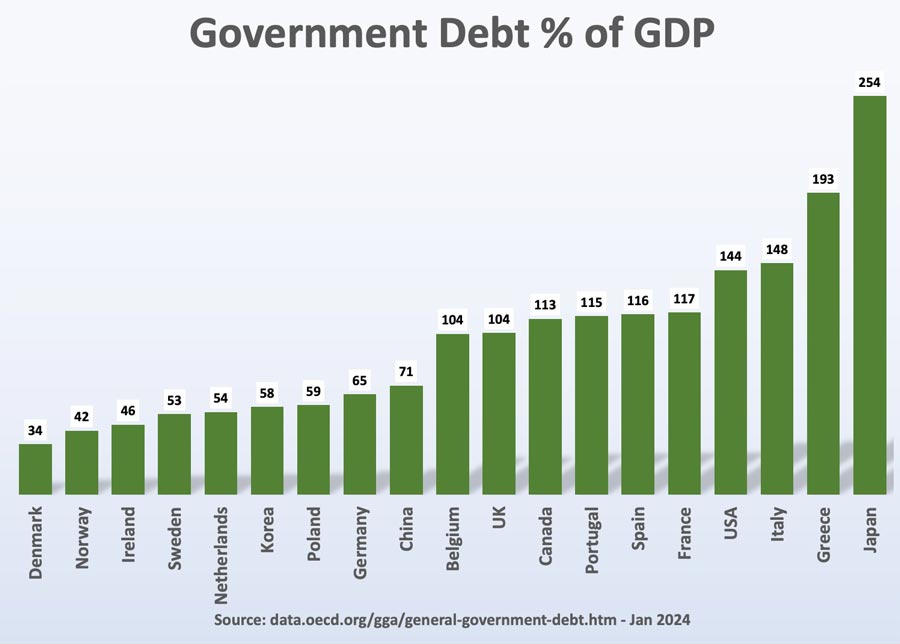
Although 107% of GDP is high by recent UK standards, it is worth bearing in mind that other countries have a much bigger problem. Japan, for example, has a National debt of 256%, Italy is over 157%. The US national debt is over 132% of GDP. [See other countries debt].
How to reduce the debt to GDP ratio?
- Economic expansion which improves tax revenues and reduces spending on benefits like Job Seekers Allowance. The economic slowdown which has occurred since 2010 has pushed the UK into a period of slow economic growth – especially if we consider GDP per capita growth. Therefore the further squeeze on tax revenues has led to deficit-reduction targets being missed.
- Government spending cuts and tax increases (e.g. VAT) which improve public finances and deal with the structural deficit. The difficulty is the extent to which these spending cuts could reduce economic growth and hamper attempts to improve tax revenues. Some economists feel the timing of deficit consolidation is very important, and growth should come before fiscal consolidation.
- See: practical solutions to reducing debt without harming growth
Other countries debt
See also:

Thank you for this article, it is are to find this kind of info in such an easy to read format.
I have one question however, who is all this money owed to? Who is so rich that they can lend countries so much money?
It the Banking system that has failed because of very loose lending system. Instead of excessive borrowing and provide the stimulus. The government should directly control most of the Bank and public sector unit , create more employment. The government should also put a cap on the exposure on all public fund i.e, the safeguard the pension fund. Instead of talking of liberalisation, its time to talk about protectionism.
too late for protectionism, we are now in a world of globalisation, most of our labour workforce has shifted to India and China, its fine showing debt as a percentage of GDP, look at the GDP after the war and look at it now, huge difference.here in the UK we have had 10 years of plenty, why didnt we save for the lean times ?only today it was revealed the bank of England lent 61 billion to HSBOS and RBS (behind closed doors). i tend to go with conspiry theorists when it comes to money, google
zeitgeist addendum
I agree with Martyn above,… massive debt is bad enough but when quantified against GDP it is even more horrific! What do we produce??? Some oil, about to run out, aviation,..given away to EU and the world (Frank Whittle), some military,…. Most money is generated by the city looking after global finance, and what happens when the bubble bursts on global markets (Japan about to pop)? Game over, thats what! Build that wind turbine and get diggin the veggies baby, Mad Max here we come!!
Blah it’s ok – just blame the disabled and unemployed – scroungers!!!
All those loverly houses and smart cars and fashionable attire and 2 foreign holidays you all supposedly ‘worked hard for’ in jobs that actually only cost the nation money as opposed to earning it any and at a rate of anything from 5 times as much to 1000’s of times as much as the unemployed are scrounging in order to exist in this looney system we all call capitalism? Millions of pounds bonuses for running our monetary system into the ground?? Millions of pounds for politicians that have never sucessfully resolved any issue and if you look have actually caused more international resentment and competetive rivalry than all the fascists put together.
Then you spend millions to send our soldiers to go force this nightmare on other unsuspecting countries saying how great and fair it is?? Its a free for all grab a wad to any who have acquired the means to do come and ‘have some!!’ imigrants with dosh acquired in the same manner from even more impoverished populations welcomed too – We been a good cash cow for generations, come get some and then do it to your indigenous population just like we do!! When it gets a bit unruly we can start another world war and duck the conscription like last time.
Bring lots of problematic refugees from all over the world and flood the stable society – gives them at the bottom something else to worry about instead of watching us mugging the national income with ever complicated – but legal – systems and techniques – oh and whilst we send some of them terrrible unemployed people who worked on the side trying to calve out of this ‘overfull’ system, an income for themselves and their family – we will dip into the expenses system for a mortgage we dont have and havent had for nearly 2 yrs at a tune of £40,000.
All this we never would have known about if someone hadnt spilled the beans in protest at our lack of ability to supply our soldiers in harms way with proper and adequate life saving equipment. This isnt Grt Britain or England the land of angels – this is a land of foreigners and cash grabers who have no interest to work for it’s preservation cos they never knew it as what it was,
We’ve been Hijacked!!
what are the security for these guilts or bonds that the government exchange for the currency?
Isn’t the problem that the younger generation have had their future wealth largely taken by the older generation? It may have happend by mistake but in any event longer life expectancies and high pension entitlements are a time bomb for the futre, aren’t they? There is an article discussing the subject at http://www.recession.vo.uk.
Red you are spot on, The Goverment should print the money then we would have no interest to pay on the debt. The goverment should abolish fractional banking. Let the Banks that have Lost money go bankrupt. Banks are Just leaches keeping us all as slaves. Get ready for hyper inflation, higher taxes. No doubt they will do something to are currency, join the Euro so that they can make it even more worthless . After all that to keep the majority of people in the dark ,we as a nation will go to war. This is all been engineered by the Banks. Dont forget wealth is not lost, just transfered.
US Government debt is approaching 100% and will breach 100% of GDP by 2010 or 2011 adding over 1 trillion dollars of debt yearly. Interest payments alone are 500 billion yearly and rising.
America has not invested in each infrustructure, educating it’s workforce, Environmental Standards and Sustainable developement,etc. It has spent huge sums of money on Military adventures, Police-Prison Industrial Complex, Homeland Security, CIA, NSA, FBI, ATF, etc,etc which are basically aimed at controlling US Citizens under a Dictatorship.
While it has given trillions of Dollars to banks and other Corporations and most of all the Federal Reserve.
On Top of this most of the debt or a good portion is owed to Europe and Asia while Countries like Japan have invested in INfrastructure, education, etc and owe the money to themselves! A big difference!!!!!
Japan and Germany for Example are large Creditor Nations because they have large Export Industries and Services which Create Great wealth for these countries, the average Citizen Saves money or invests it while keeping a 15% savings rate which allows Japan or Germany to Borrow Money from their own people because the People along with the Country and Corporations based in these countries have huge sums of wealth which is not the case for a country like the USA who has a huge current account deficit, it’s citizens do not save and are deep in debt, the Companies are deep in debt so when it comes time for the US Government to borrow they increasingly borrow from other countries with the profits going overseas and giving these countries political leverage and economic leverage over the USA or any other country that is in this same game like the UK.
This is not mentioned but Japan has a large Government debt and Germany has a lessor Government debt but they are huge Current Account Nations with high savings rates and most the their Corporations have large pools of cash on hand. These countries also invest back into their country unlike the USA.
Why does the press not pick up on these facts?
Could the Press also be owned by the Germany and Japanese-Oh I forgot in America the Newsprint and Books are mostly owned by German Multinational Companies! And a large chuck of American Assets overall are owned by a few Creditor Nations so try to report on the truth-If your not already bought up !!!
a £100 economy is made it borrows this £100 at say 5% interest or £5.00
value of economy = £100 = peoples wages/goods bought and sold etc .. its activity
who and how is the interest of £5 payed